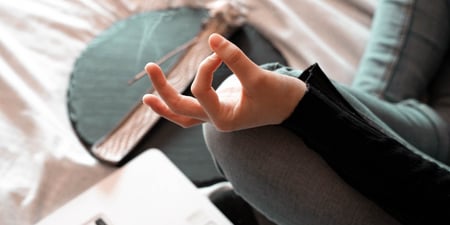The Secret Of Happiness Is Connection
Nicky Smith
|
4 Mar 2025

In his book Lost Connections, Johann Hari talks about disconnection from other people and the natural world as some of the causes of depression and anxiety which are increasing in prevalence in modern society. Let's explore how your yoga and meditation practice can support connection with nature, connection with others and connection with yourself.
Connect With Nature
As the human race has evolved, it has moved indoors and away from nature. Alongside this, our stress levels and disharmony in our bodies have risen. Being connected to the natural world on a regular basis, walking in nature, feeling our feet on the earth, listening to the ocean waves and breathing in fresh air makes us feel better and more at ease.
Consider bringing more connection to nature into your yoga and meditation practice by taking it off the mat or cushion and heading outside. Having your bare feet on the earth itself can be very grounding and rejuvenating.
Many of the postures of yoga are inspired by nature itself, such as the tree pose or vrksasana. Next time you practice the tree pose, instead of being concerned about alignment or making a shape that looks like the classic image of tree pose you have seen in a picture, visualise your favourite tree. Maybe even practice the pose outdoors near a tree, imagine the roots of your tree going deep into the earth, bringing a sense of stability and the branches and leaves expanding to the sky above with a sense of balance and flexibility. Remember how each tree is unique yet interconnected with all the other trees that surround it.
Sitting in nature for a mindfulness meditation practice can be refreshing as you feel the safety of the earth below. You breathe in fresh air and feel the radiant warmth of the sun on your skin as you tune in and connect to the cycles of nature.
If you are not able to or prefer not to practice outdoors in nature, bring in visualisations and affirmations that are nature-based.

Connect With Others
Sangha is a Sanskrit word that means "connecting with a like-minded group of people with a common goal of spirituality". While there are benefits of practicing yoga and meditation on your own, it is often more potent and powerful practiced and connection with others. This might be together in a group, or these days, connecting online via platforms like Zoom.
We are all human and we innately seek connections with others and to build a sense of community. You could practice yoga and meditation on your own with the many videos on YouTube or meditation apps you can download to your mobile device. However, there is something powerful and meaningful about practising with others whether in the same room or at the same time at various places around the world via online platforms.
Ongoing connection to others is nurturing, empowering and motivating. We are born hardwired for the need for connection and it is human nature to search for belonging.
The word yoga can be translated as union, which is not limited to unity of the body, mind and soul but unity with the hearts of other beings. Let the practice of yoga and meditation help you find your tribe, and even more importantly, enhance your relationships with others outside of your practice with family, friends and colleagues.
Connect With Yourself
Many people often feel a sense of disconnection from their body and mind - a disembodied state with very little felt awareness of the body. Our minds ruminating on the past or worrying about the future, we are literally not present. Mind body practices such as yoga and meditation can support us to connect with ourselves and all of the layers of our being.
In yoga, the kosha model describes five layers or sheaths of the body which are the physical, energetic, mental/emotional, intellectual and blissful layers. As we practice yoga or meditation, we can check in and connect with each of these koshas or layers to bring more awareness into our daily life.
We observe where our awareness is taken in the physical body, noticing the breath, awareness of the emotions we have arrived with, all with no judgement - just observing. This in turn can support us to build a crucial connection to self, particularly if you take this practice off the mat or cushion and take time to check in the with the layers of your being regularly during your day.
It takes practice to achieve this connection with self, so begin with some mindful movements, breath practices and concentration practices that support us to delve deeper on an inner expedition. Think of it as ‘innercise’ rather than ‘exercise’ and know that it is just as important to get daily ‘innercise’ as we know it is to get 30 minutes daily physical exercise.
Once you have have built inner connection with yourself, you can then benefit from deeper and more meaningful connection to others and connection to all that is, whether that is nature, the divine or other higher purpose that resonates with you.

Deep connections are so desperately needed in our modern society. We have a tendency to be cut off from the natural world around us and supposedly more ‘connected’ in the online world, however this often leaves us feeling lonely and isolated.
Yoga and meditation can cultivate connections to positively impact and transform our lives and the lives of others. Connecting with ourselves, with others and with nature can bring us more joy and happiness throughout our lives.
The secret of happiness is connection and the secret power of yoga is connection, or as Nischala Joy Devi interprets it in her book by the same name, “Yoga is the uniting of consciousness in the heart.”
Johann Hari (2019) Lost Connections: Why You’re Depressed and How to Find Hope. Bloomsbury, United Kingdom
Nischala Joy Devi (2007) The Secret Power of Yoga: A Woman’s Guide to the Heart and Spirit of the Yoga Sutras. Three Rivers Press, New York

Nourishment For Your Soul Delivered To Your Inbox
Disclaimer: This Content has been developed from our generous global community and is intended for informational purposes only. This Content is not, nor is it intended to be, a substitute for professional medical advice, diagnosis, or treatment and should never be relied upon. Further, the personal views and experiences published are expressly those of the author, and do not represent the views or endorsement of SoulAdvisor through the act of publication on our site.
























